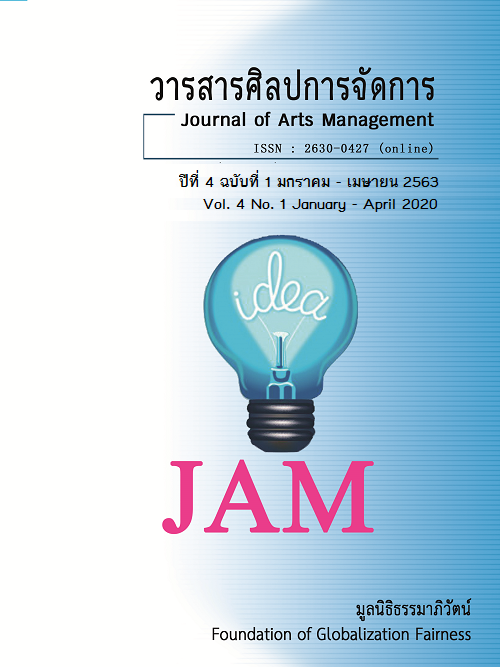Organizational Effectiveness
Main Article Content
Abstract
This review article aimed to study about managing of leader or administrator mainly. Using synthesis documentary such as article, research both National and International. The academic article namely, leadership management for Increasing organizational effectiveness therefore focus mainly on the management that the leaders or the executives of the organization because the leader or organization executives are an important mechanism in the organization that must create changes for the organization. It is also a part that must be changed before all personnel in the organization. Organization leaders or leaders must have knowledge, competence, and experience and can solve immediate problems. By fully using his intelligence also must be fair in administration have good communication skills including the need for in-depth management psychology to manage the work smoothly and maximize benefits and will directly affect morale and the encouragement of personnel causing personnel in the organization to devote themselves to their full capacity.
It was found that the success of an organization depends on the change leadership that influences the effectiveness of the organization, which shows that under such highly changing conditions. Effective leaders are Leaders with the characteristics of change leadership which will be able to cope with various organization situations and create good effectiveness for the organization.
Article Details
Views and opinions appearing in articles in the Journal of Arts of Management It is the responsibility of the author of the article. and does not constitute the view and responsibility of the editorial team I agree that the article is copyright of the Arts and Management Journal.
References
Barker, D.G. (1992). Changing Social Values in Europe. Business Ethics: A European Review, 1(2),
-107.
Bass, B. M. (1985). Leadership and performance beyond expectation. New York: Free Press.
Bass, B. M. & Avolio, B. J. (1994). Introduction. In B. M. Bass & B. J. Avolio (Eds.), Improving organizational effectiveness through transformational leadership. California: Sage. Dessler.
Bass, B.M. & Avolio, B.J. (1995). The four I’s transformational leadership. Journal of European Industrial Training. 15(2), 9-16.
Burns, J., (1978). Leadership. New York: Harper & Row.
Dessler, G. (1998). Management:Leading People and Organization in the 21st Century. New Jersey: Prentice – Hall international.
Fayol, Henri. (1949). General and Industrial Management. London: Sir Isaac Pitman & Sons.
Gibson et al. (1973). Organizational: Behavior, Structure, Process Behavior. Dallas, Taxas: Business Publication, Inc.
Gibson, J. L., Ivancevich, J. M., & Donnelly J. H., (1994). Organizations Structure, Process, Behavior. Texas: Business Publications.
Hellriegel, Don, Jackson, Susan E., & Slocum, John W. (2004). Management A CompetencyBased Approach. Ohio: Thomson South-Western.
Hersey, P. and Blanchard, K.H. (1982). Management of organizational behavior: Utilizing Human Resources. New York: Prentice –Hall.
Hoy, W. K., & Miskle, C. G. (2001). Educational Administration: Theory Research and Practice (6th ed.). Boston: McGraw-Hill.
Jones, G. L. (2002). Organizational Theory, Design, and Change. (3rd ed. ).Taxas: Pearson Education.
Mayer, R. C., Davis, J. H., & Schoorman, F. D. (1995). An Integrative Model of Organizational Trust. The Academy of Management Review, 20(3), 709– 734.
Mushinsky, P. M. (1997). Psychology applied to work an introductions to industrial and organizational psychology. North Carolina: Hyper graphic Press.
Netphana Yawiraj. (2004). Leadership and Strategic Leadership. 2nd edition, Bangkok: Central Express Company Limited.
Nit Sammaphan. (2003). Leadership power to drive the organization towards excellence. Bangkok: Innocent graphics.
Owen E. Hughes. (2003). Public Management and Administration: An Introduction. Palgrave Macmillan.
Pinyo Manusilp. (2008). The development of linear structural relationship model of factors affecting The effectiveness of the team in schools under the Office of Basic Education.
Ph.D. thesis (Educational Administration Program). Graduate school Khon Kaen University.
Phongthep Kanthasuwan. (2010). The effectiveness of the organization: The act of Manotas. Journal of Romyaphruek. 28, 134-182.
Rattikorn Jongvisal. (2008). Entrepreneurial Leadership: Structural Relations. Between psychological traits, teamwork, and accomplishment Business. Bangkok: Kasetsart University.
Robbins and Coulter. (2007: 89). Organization Theory: Structure, Design, and Applications.
New Jersey:Prentice-Hall.
Robbins, S.P. & DeCenzo. (2005). Management. (6th ed.). New York: Prentice-Hill.
Rung Kaewdang. (2003). Juristic person school. Bangkok: Thai Wattana Panich.
Sanoh Tiyao. (2003). Management Principles. (3rd edition). Bangkok: Thammasat University.
Schultz, D. P., & Schultz, S. E. (2002). Psychology and work today: An introduction to industrial and organizational psychology. (7th ed.). New Jersey: Prentice Hall.
Simon, Herbert A. (1976). Administration Behavior: A study of Decision-Making Processes in Administrative Organization. New York: The Free Press.
Siriwan Serirat et al. (2002). Organization and management. Bangkok: Thammasarn.
Somkid Bangmo. (2003). Organization and management. Bangkok: June Publications.
Steers, Richard. M. (1977). Organization Effectiveness: Behavioral View.Santa Monica, CA: Goodyear.
Stogdill, R. M. (1974). Handbook of Leadership: A Survey of Theory and research. New York: Free Press.
Tead, O. (1970). The Art of Leadership. New York: Mc Gra-Hill Book Company.
Thongchai Santiwong. (1994). Organizational theory and design. Bangkok: Thai Wattana Panich.
Thanad Dejsub. (2007). Management of Thai Chana Suek Subdistrict Administrative Organization, Thung Saliam District Sukhothai According to the principles of governance Master of Science in Political Science. Administration and Development Program, Urban and Rural Community, Uttaradit Rajabhat University.
Weihrich, Heinz and Koontz, Harold. (2005). Management: A Global Perspective. New Delhi: McGraw Hill.
Wichai Rupkamdee. (1999). Management. Bangkok. National Institute of Development Administration.
Wirat Sanguanwongwan. (2008). Management and Organizational Behavior. Bangkok: Publisher of Chulalongkorn University.
Wittaya Danthamrongkun. (2003). Administration. Bangkok: Third Wave Education.


